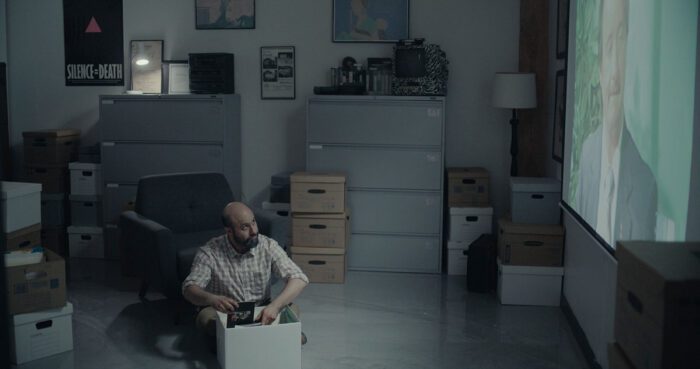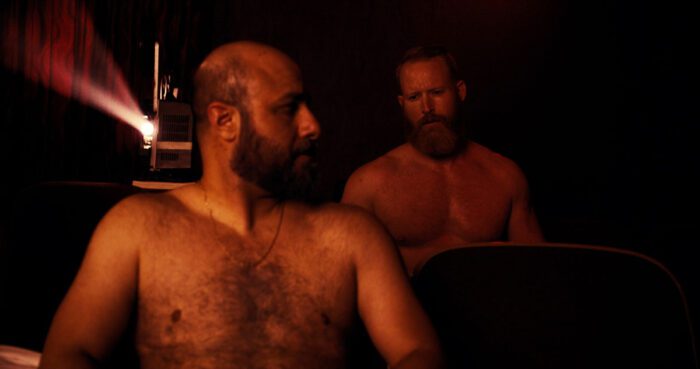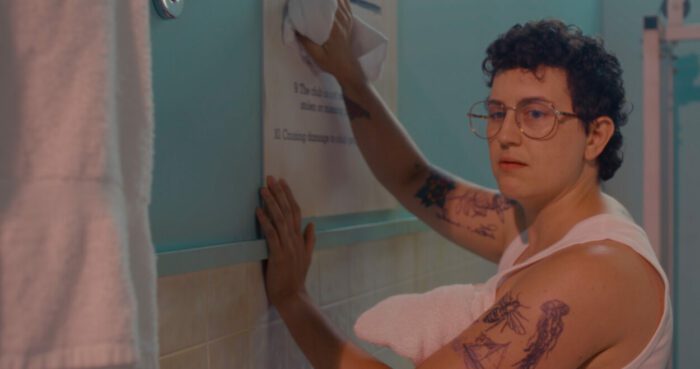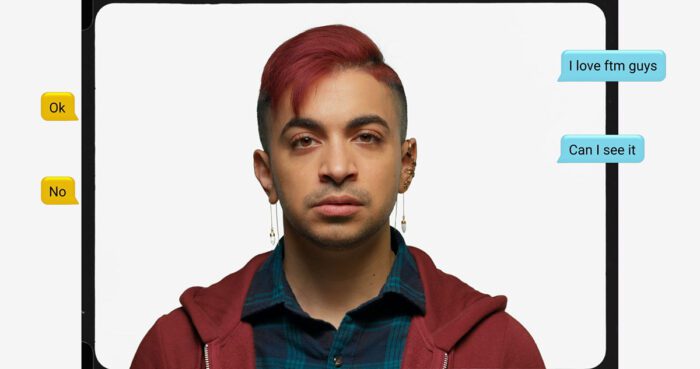While there may be plenty of other films about cis gay men and their history, there are still astoundingly few for their transgender counterparts. With his new film Desire Lines, (2024) director Jules Rosskam is aiming to remedy that. A far cry from films such as Love, Simon or Blue is the Warmest Color, Desire Lines is equal parts fiction and documentary. Changing between subject matter and events is Ahmad (Aden Hakimi), a man finding his way through archives of everything from bathhouses to niche queer zines.
Right from the start, Desire Lines shows its queerness on its sleeve, showing the intentionally narrow bathhouse hallways and steamy rooms filled with the subjects of Ahmad’s research. Gay men, even more specifically trans men, are everywhere and nowhere. Sometimes unseen, sometimes openly visible, Rosskam plays his cards close to his chest at first, easing people less well-versed in the subject matter into the film’s concepts. As a documentary tactic, this is excellent, bringing newcomers up to speed while still entertaining those who may already have an idea of the history being displayed here.

Much of the film focuses on the activist Lou Sullivan, someone well-known for his work as both an activist and an author. Using archive footage of Sullivan in the final years of his life, Rosskam is able to illustrate a portrait of a man who was keenly aware of the ways in which others perceived him, yet also that society would shift to be more accepting of those like him.
In the final interviews shown, while Sullivan was suffering from AIDS-related complications, the film still never attempts to portray Sullivan as a focus of pity. If anything, Sullivan’s openness about his health and sexuality is viewed as heroic, an inspiring case of authenticity.
Perhaps best viewed as a counterpart to 2022’s Framing Agnes (dir. Chase Joynt), Desire Lines takes a very different perspective on its subject matter. The people Ahmad sees in the archive are not long-gone singular cases but instead have living reflections walking around today. The faces seen in the past are neither entirely unique nor foreign, simply examples of the same types of people, trying to lead lives with similar goals.

While it may seem jarring the first time, there is a surprising vulnerability in the places where Rosskam’s input is displayed directly on screen. Multiple times, a desktop is shown, with dozens of interviews and files to be organized. On its own, this may not seem like much, but watching these files be replayed, paused, labeled, and the like feels like a glimpse into the director’s thoughts, if only for a minute. None of these scenes come across as being overly scripted, and the silence beyond the clips and clicks adds to this concept of watching Rosskam’s work and directly reacting to the words of others.
There’s a great reverence for the history the film centers on. A weaker team could easily have laughed at the ideas presented, and it’s more than likely that an exclusively cis team would have. Part of what makes Desire Lines so different from other films is the ways in which it presents a largely unknown history as though it should be common knowledge, part of every school’s history and sexual education courses. Even niche zines, such as Original Plumbing make an appearance. It would be easy to simply mention these as a cheeky nod to those who already know, but instead, they’re clearly discussed and displayed, used as a teaching tool more than a reference for a select few.

Diversity in the subject matter is incredibly important in a documentary, but the diversity in interview selections and clips is something that really jumps out in Rosskam’s film. The men interviewed not only are distinct in appearance but also in responses. One that is immediately memorable is a transmasculine person who openly talks about their love for their vagina, the ways they enjoy it as a part of themself.
A surprising (although not altogether unwelcome) focus is placed on the ways that others interpret the trans body. A distinct point is made to show how many cis people choose to intellectualize the trans body rather than accept it as it is and experience any sort of feeling about it, desire or otherwise. Being one of the few films that makes mention of chasers at all was already a welcome addition, but it’s also immediately clear that Desire Lines is against what they stand for. The film makes a fundamental fact about chasers clear, that they have no desire for trans people, only for their idea of our bodies.

On top of the ways Desire Lines confronts the idea of chasers, it also makes it clear that even gay spaces are not always welcoming to transgender people. While this may come as a surprise to some, it’s a well-known fact for many others who navigate these spaces in a trans body. The need for safety over pleasure comes up over and over in the film, and it adds an ounce of realism to its scenes of dramatic interpretation.
With an incredibly touching ending and more than enough history and intimacy along the way, Desire Lines is something hard to come by these days. In a time where the rights of transgender people are so frequently under attack and made to be something entirely new, it’s incredible to see a film that doesn’t only focus on our history, but the similarities we share with those who came before.
Desire Lines will be screening at the ImageOut Film Festival in Rochester, NY on April 27.



